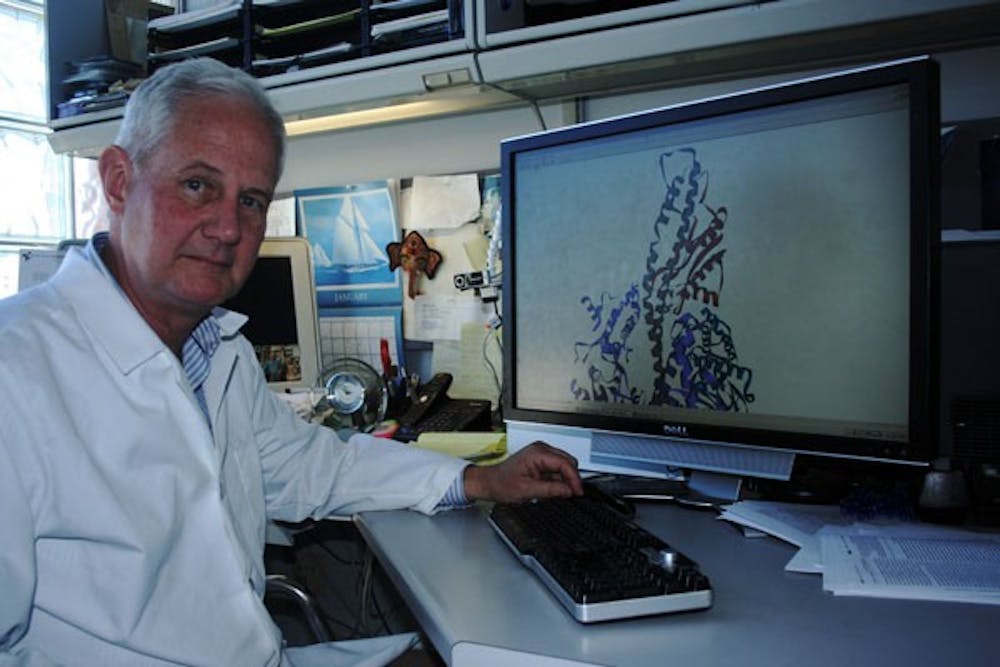 School of Life Sciences professor Wayne Frasch was named 2012 Innovator of the Year for creating a nanodevice that can detect infectious diseases. (Photo by Manikandan Vijayakumar)
School of Life Sciences professor Wayne Frasch was named 2012 Innovator of the Year for creating a nanodevice that can detect infectious diseases. (Photo by Manikandan Vijayakumar)School of Life Sciences professor Wayne Frasch was named the 2012 Innovator of the Year earlier this month for creating a nanodevice that specializes in early detection of diseases.
For nearly a decade, Frasch has been working on his invention, which is a molecular motor-powered nanodevice that is capable of detecting single molecules that indicate the presence of infectious and inherited diseases and even cancer.
Frasch, who was chosen as the winner by the Arizona Technology Council and the Arizona Department of Commerce, said he is grateful of the accomplishment and does not know who nominated him.
“I was just happy to be a finalist,” Frasch said. “There (is a lot) of great innovative work going on, and the other projects were outstanding, but it’s quite a compliment to win.”
The nanodevices are constructed so the device will blink red and green when the presence of a pathogen is detected, indicating a disease exists, Frasch said.
“We are just looking for some presence in a molecule that indicates toxins or disease,” he said.
Over the past several years, more than 15 people have contributed to the development of the nanodevice, which sends the data to a computer to increase the speed and accuracy of analyses.
“The software quantitates it, (and shows) how many molecules we are talking about,” Frasch said. “(It) takes pictures automatically so that it documents it and you have a hard copy of what you’ve done as a record.”
Frasch began this project nearly 10 years ago with initial support from the Defense Advanced Research Projects Agency.
He then received most of his funding from the Science Foundation Arizona, a nonprofit organization set up by the state government to develop practical applications of academic research, Frasch said.
James Martin, a recent molecular and cellular biology doctorate recipient, has been vital to assisting Frasch with this project by helping to build the bridge between the microscope and the molecules.
“In nano-world, most things are too small,” Martin said. “Without the nanodevice, you can’t even see anything to detect the proteins.”
The nanodevice will be useful in detecting the presence of many cancers, Martin said.
“A lot of cancers are treatable when detected early,” he said. “The important thing is if we can detect low levels of molecules that serve as cancer biomarkers, we can get more effective treatments.”
Frasch and his team worked relentlessly to get the project off the ground and Frasch hopes to prepare the project for fieldwork.
“Sure it’s a challenge, but if you’re up to the challenge and you see it as an exciting possibility, then you throw yourself into it,” Frasch said. “Once you work day and night for several months, it’s like ‘Wow, we made this happen.’”
Despite the award, Frasch still wants to make improvements to the device.
He is the founder and CEO of Attometrics, a business that serves to commercialize his inventions.
Frasch will work with ASU’s Venture Catalyst, a program that develops student and faculty businesses, to get his business plan off the ground.
Venture Catalyst venture manager Wiley Larsen said he has high hopes for Frasch and his many projects.
In the next six months, Larsen and his team will analyze Frasch’s business plan and pitch, and introduce him to investors who can support him.
“Our involvement starts now in giving him new business opportunities and helping him produce revenue,” Larsen said. “We’ve got really, really high expectations for Frasch.”
Reach the reporter at cldas@asu.edu




